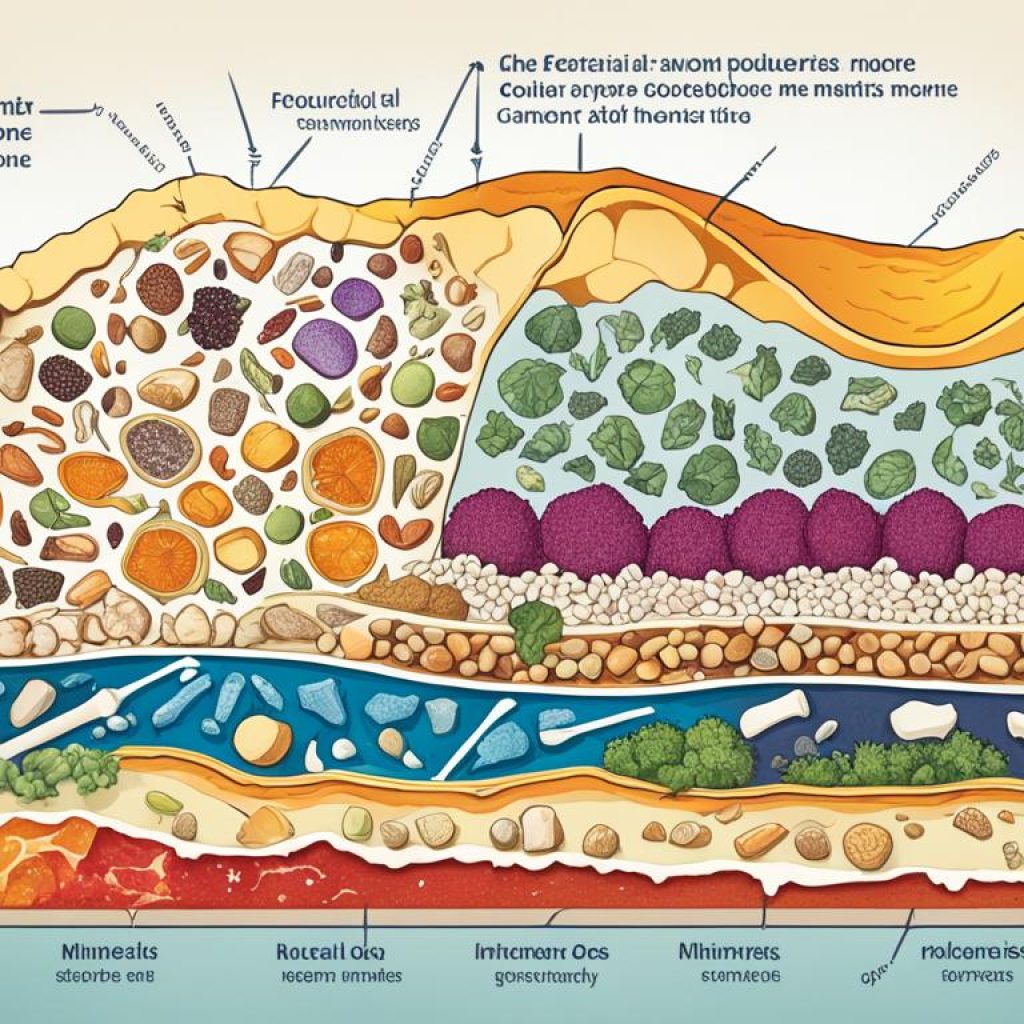Minerals play a vital role in maintaining overall body health. They are essential for various functions within the body, including the proper functioning of bones, muscles, heart, and brain. Minerals also contribute to the production of enzymes and hormones, which are necessary for proper body functioning and maintaining internal balance.
The body requires both macrominerals, such as calcium, phosphorus, magnesium, sodium, potassium, chloride, and sulfur, and trace minerals, such as iron, manganese, copper, iodine, zinc, cobalt, fluoride, and selenium, in adequate amounts for optimal health.
Key Takeaways:
- Minerals are essential for maintaining overall body health.
- They play a role in the proper functioning of bones, muscles, heart, and brain.
- Minerals contribute to the production of enzymes and hormones.
- The body requires both macrominerals and trace minerals for optimal health.
- Include a variety of nutrient-rich foods in your diet to ensure an adequate intake of essential minerals.
Importance of Macrominerals
Macrominerals are essential for the body in relatively larger amounts. These minerals play crucial roles in various physiological processes, contributing to overall health and well-being.
Calcium: Calcium is vital for maintaining strong bones and teeth. It is also involved in muscle contraction, blood clotting, nerve transmission, and cell signaling.
Phosphorus: Phosphorus plays a significant role in building and repairing bones and teeth. It is also essential for proper nerve function and muscle contraction.
Magnesium: Magnesium is involved in numerous enzymatic reactions within the body. It contributes to DNA synthesis, antioxidant activity, and overall metabolic regulation.
Sodium: Sodium helps in muscle contraction and nerve impulse conduction. It also maintains fluid balance in the body.
Potassium: Potassium plays a crucial role in maintaining fluid balance, nerve conduction, and brain health.
Chloride: Chloride, in association with sodium, helps maintain fluid balance and is essential for proper digestion.
Sulfur: Sulfur possesses antibacterial properties and aids in acne treatment and DNA repair.
Including these macrominerals in your diet ensures the proper functioning of your body and supports overall health.
| Macromineral | Function | Dietary Sources |
|---|---|---|
| Calcium | Strong bones and teeth, muscle contraction, blood clotting, nerve transmission, cell signaling | Milk, dairy products, cashews, dates, broccoli, parsley, greens |
| Phosphorus | Building and repairing bones and teeth, nerve function, muscle contraction | Meats, poultry, beans, nuts, seeds, dairy products |
| Magnesium | Enzymatic reactions, DNA synthesis, antioxidant activity, metabolic regulation | Green leafy vegetables, legumes, nuts, seeds, whole grains |
| Sodium | Muscle contraction, nerve impulse conduction, fluid balance | Table salt, processed foods |
| Potassium | Fluid balance, nerve conduction, brain health | Bananas, sweet potatoes, avocados, beets, dates |
| Chloride | Fluid balance, digestion | Table salt, tomatoes, celery, lettuce |
| Sulfur | Antibacterial properties, acne treatment, DNA repair | Seafood, legumes |
Significance of Trace Minerals
Trace minerals are essential for optimal health, although they are required in smaller quantities by the body. These minerals, including iron, manganese, copper, iodine, zinc, cobalt, fluoride, and selenium, play crucial roles in various physiological processes.
Iron
Iron is necessary for the formation of hemoglobin, a protein that carries oxygen in the blood. Adequate iron levels are important for maintaining energy levels and preventing iron-deficiency anemia.
Manganese
Manganese is involved in protein, carbohydrate, and cholesterol breakdown. It also plays a role in cell division, blood clotting, and bone development. Manganese is found in nuts, whole grains, and leafy green vegetables.
Copper
Copper aids in energy production and facilitates the uptake of iron. It is also involved in the formation of connective tissues and the functioning of the nervous system. Copper-rich foods include liver, shellfish, and whole grains.
Iodine
Iodine is essential for the production of thyroid hormones, which regulate metabolism and growth. It also plays a role in brain development and overall cognitive function. Iodized salt, seafood, and dairy products are good sources of iodine.
Zinc
Zinc is crucial for cell division, immune function, and wound healing. It also plays a role in DNA synthesis and hormone production. Foods rich in zinc include oysters, red meat, beans, and whole grains.
Cobalt
Cobalt is an essential component of vitamin B12, which is necessary for the production of red blood cells and the functioning of the nervous system. Vitamin B12 is mainly found in animal products such as meat, fish, and dairy.
Fluoride
Fluoride is important for dental health as it helps prevent tooth decay and strengthens tooth enamel. It is commonly found in drinking water, toothpaste, and certain foods.
Selenium
Selenium is a powerful antioxidant that helps protect cells from oxidative damage. It also plays a role in thyroid hormone metabolism and immune function. Good sources of selenium include Brazil nuts, seafood, and organ meats.
Ensuring an adequate intake of these trace minerals is essential for maintaining overall health and preventing deficiency-related health risks.

Dietary Sources of Essential Minerals
Most people obtain the minerals they need through a balanced diet that includes a variety of foods. Here are some common dietary sources of essential minerals:
Calcium:
Calcium can be found in:
- Milk and dairy products
- Cashews
- Dates
- Broccoli
- Parsley
- Greens
Sodium:
Sodium is primarily obtained from:
- Table salt (moderate intake recommended)
Potassium:
Potassium-rich foods include:
- Bananas
- Sweet potatoes
- Avocados
- Beets
- Dates
Chloride:
Chloride can be found in:
- Table salt
- Tomatoes
- Celery
- Lettuce
Magnesium:
Magnesium sources include:
- Green leafy vegetables
- Legumes
- Nuts
- Seeds
- Whole grains
Phosphorus:
Phosphorus is abundant in:
- Meats
- Poultry
- Beans
- Nuts
- Seeds
- Dairy products
Iodine:
Iodine is primarily obtained from:
- Iodized table salt
Iron:
Iron-rich foods include:
- Green leafy vegetables
- Beef
- Chicken
- Pork
- Organ meats
Zinc:
Zinc can be found in:
- Oysters
- Red meat
- Poultry
- Beans
- Nuts
- Whole grains
Copper:
Copper sources include:
- Chocolate
- Liver
- Shellfish
- Wheat bran cereals
Manganese:
Manganese-rich foods include:
- Whole grains
- Nuts
- Soybeans
- Rice
Sulfur:
Sulfur-rich foods include:
- Seafood
- Legumes
Selenium:
Selenium can be obtained from:
- Brazil nuts
- Seafood
- Organ meats
| Mineral | Dietary Sources |
|---|---|
| Calcium | Milk and dairy products, cashews, dates, broccoli, parsley, greens |
| Sodium | Table salt (moderate intake recommended) |
| Potassium | Bananas, sweet potatoes, avocados, beets, dates |
| Chloride | Table salt, tomatoes, celery, lettuce |
| Magnesium | Green leafy vegetables, legumes, nuts, seeds, whole grains |
| Phosphorus | Meats, poultry, beans, nuts, seeds, dairy products |
| Iodine | Iodized table salt |
| Iron | Green leafy vegetables, beef, chicken, pork, organ meats |
| Zinc | Oysters, red meat, poultry, beans, nuts, whole grains |
| Copper | Chocolate, liver, shellfish, wheat bran cereals |
| Manganese | Whole grains, nuts, soybeans, rice |
| Sulfur | Seafood, legumes |
| Selenium | Brazil nuts, seafood, organ meats |
Importance of Minerals for Immune Function
Minerals, such as magnesium and zinc, play a crucial role in supporting immune function. Adequate intake of these minerals is essential for maintaining a healthy immune system.
Magnesium deficiency has been linked to immune dysfunction, increased inflammatory cytokine production, and increased susceptibility to infections. This mineral is involved in various immune processes, including phagocytosis, production of reactive oxygen species, and regulation of immune cell function.
Zinc deficiency can impair the immune response and increase the risk of infections. It also plays a vital role in immune cell development and function. Zinc is involved in the production of antibodies, cytokines, and other immune system components.
Both magnesium and zinc contribute to the overall strength and effectiveness of the immune system. They are necessary for the proper functioning of immune cells, including T-cells, B-cells, and macrophages. These minerals support immune cell communication, activation, and response to pathogens.
“Adequate intake of magnesium and zinc is crucial for a robust immune system and optimal immune function.”
The Role of Magnesium in Immune Function:
Magnesium plays a critical role in immune system regulation and has both anti-inflammatory and immunomodulatory effects. It helps regulate the activity of immune cells and the production of inflammatory cytokines. Magnesium deficiency can lead to immune dysfunction and increased susceptibility to infections.
The Role of Zinc in Immune Function:
Zinc is involved in various immune processes, including the development and function of immune cells. It plays a role in immune signaling, activates enzyme reactions, and acts as a structural component of proteins involved in the immune response. Zinc deficiency can impair immune function and increase the risk of infections.
Recommended Daily Intake of Minerals for Immune Health:
| Mineral | Recommended Daily Intake |
|---|---|
| Magnesium | 400-420 mg for men 310-320 mg for women |
| Zinc | 11 mg for men 8 mg for women |

Ensuring an adequate intake of minerals, particularly magnesium and zinc, through a balanced diet is essential for supporting immune function. Additionally, individuals with specific dietary restrictions, medical conditions, or inadequate dietary intake may consider supplementation under the guidance of a healthcare professional. By prioritizing mineral-rich foods and maintaining optimal mineral levels, individuals can enhance their immune system’s ability to fight off infections and maintain overall health.
Minerals and Inflammatory Response
Minerals, such as magnesium and zinc, have been found to have remarkable effects on the inflammatory response. Magnesium, in particular, has been shown to decrease the production of inflammatory cytokines, providing an innate immunomodulatory mechanism.
Zinc, on the other hand, plays a crucial role in regulating the inflammatory response. Both minerals have been extensively studied for their anti-inflammatory properties, and research suggests that they can help reduce inflammation in the body.
Adequate levels of magnesium and zinc are important for maintaining overall health and wellness, as deficiencies in these minerals can lead to increased inflammation and related health problems.
“Minerals like magnesium and zinc play a key role in modulating the body’s inflammatory response, impacting our overall health and well-being.”
To illustrate the impact of minerals on inflammation, here is a table showcasing the anti-inflammatory effects of magnesium and zinc:
| Mineral | Effects on Inflammation |
|---|---|
| Magnesium | Reduces production of inflammatory cytokines |
| Zinc | Regulates the inflammatory response |
As shown in the table, both magnesium and zinc play significant roles in managing inflammation, which is crucial for maintaining a healthy body.
Having adequate levels of these minerals through a balanced diet or supplementation may help decrease inflammation and support overall well-being.
Minerals and Bone Health
Proper mineral intake is crucial for maintaining strong and healthy bones. Key minerals such as calcium, phosphorus, magnesium, copper, and zinc play essential roles in bone health and function.

Calcium and phosphorus are fundamental components of bone structure, providing the foundation for strength and stability. These minerals work together to form hydroxyapatite crystals, which give bones their hardness and density.
Magnesium is involved in bone development and strength. It aids in the absorption of calcium and stimulates the activity of osteoblasts, the cells responsible for bone formation and remodeling.
Copper and zinc are necessary for the production and maintenance of collagen, a protein that forms the framework of bones. Copper activates enzymes involved in collagen synthesis, while zinc plays a role in bone mineralization.
Deficiencies in these minerals can lead to bone diseases, such as osteoporosis, a condition characterized by weakened and brittle bones. Inadequate mineral intake can compromise bone density and increase the risk of fractures, especially in older adults.
To maintain optimal bone health, it is important to ensure an adequate intake of these minerals through a balanced diet. Dairy products, leafy greens, nuts, seeds, and fortified foods are excellent sources of calcium. Phosphorus can be found in meat, dairy, whole grains, and legumes. Magnesium-rich foods include spinach, almonds, avocados, and dark chocolate. Copper is abundant in shellfish, nuts, seeds, and organ meats, while zinc can be obtained from oysters, red meat, poultry, and legumes.
By prioritizing mineral-rich foods and maintaining an overall nutrient-dense diet, individuals can support their bone health and reduce the risk of bone-related conditions.
Mineral Deficiencies and Health Risks
Deficiencies in essential minerals can have significant health consequences. Without adequate intake of these minerals, various health risks can arise, impacting different aspects of the body’s functioning.
One of the primary mineral deficiencies that can lead to health risks is inadequate calcium intake. Calcium is vital for maintaining strong bones and teeth. Insufficient calcium levels can result in fragile bones and increase the risk of developing osteoporosis, a condition characterized by weak and brittle bones.
Another important mineral deficiency to be mindful of is low potassium levels. Potassium plays a critical role in heart health and muscle function. When there is a lack of potassium, it can lead to irregular heartbeats and muscle weakness.
Magnesium deficiency has been associated with immune dysfunction and an increased risk of chronic diseases. Magnesium is involved in several physiological processes, including immune regulation. Inadequate magnesium levels can compromise immune function, making individuals more susceptible to infections and chronic conditions.
An insufficient supply of iron can lead to anemia, a condition characterized by low red blood cell count and impaired oxygen transport in the body. Iron deficiency can result from insufficient dietary intake or poor iron absorption. Anemia can cause fatigue, weakness, and difficulty concentrating.
Zinc deficiency can impair immune function and wound healing. Zinc is essential for the proper functioning of the immune system, and low levels can weaken immune responses, making individuals more prone to infections and slow wound healing.
Table: Common Mineral Deficiencies and Associated Health Risks
| Mineral | Deficiency Consequences |
|---|---|
| Calcium | Fragile bones, increased risk of osteoporosis |
| Potassium | Irregular heartbeats, muscle weakness |
| Magnesium | Immune dysfunction, increased risk of chronic diseases |
| Iron | Anemia, impaired oxygen transport |
| Zinc | Impaired immune function, slow wound healing |
To prevent these health risks associated with mineral deficiencies, it is crucial to maintain an adequate intake of essential minerals. A balanced diet that includes a variety of nutrient-rich foods can help ensure sufficient mineral intake. In some cases, dietary supplements may be necessary, but it is essential to consult with a healthcare professional before starting any supplementation regimen.
Importance of Balanced Mineral Intake
Achieving a balanced intake of essential minerals is crucial for maintaining overall health. Each mineral serves specific roles and functions within the body, and a deficiency in any of these minerals can lead to various health problems. To ensure an adequate intake of all essential minerals, it is important to follow a varied diet that includes a wide range of nutrient-rich foods.
Consuming a diverse array of foods helps ensure that you receive a balanced mineral intake. By incorporating different food groups into your diet, you can obtain a variety of minerals, each with its unique health benefits. For example, calcium is essential for strong bones and teeth, while iron is necessary for healthy blood cells. Including a balance of these minerals in your diet supports overall body functioning.
Supplementation may be necessary in certain cases, particularly for individuals with specific health conditions or dietary restrictions. However, it is crucial to consult with a healthcare professional before starting any supplementation regimen. They can assess your individual needs and guide you on the appropriate dosage to avoid any potential risks or imbalances.
Overall, a balanced mineral intake plays a vital role in maintaining optimal health. By striving to incorporate a variety of nutrient-rich foods into your diet and consulting with a healthcare professional when needed, you can support your body’s mineral needs and promote overall well-being.
| Mineral | Role | Food Sources |
|---|---|---|
| Calcium | Strong bones and teeth, muscle contraction, blood clotting | Milk and dairy products, cashews, broccoli |
| Iron | Hemoglobin formation, oxygen transport | Red meat, spinach, beans |
| Magnesium | Enzymatic reactions, metabolic regulation | Leafy greens, nuts, whole grains |
| Potassium | Nerve conduction, fluid balance | Bananas, potatoes, avocados |
Conclusion
Minerals are indispensable for maintaining optimal body health. They play vital roles in various physiological and biochemical processes, ensuring the proper functioning of organs and systems, as well as the production of enzymes and hormones. Adequate intake of essential minerals, both macrominerals and trace minerals, is crucial for preventing deficiency-related health risks and promoting overall well-being.
The best way to ensure a sufficient intake of minerals is through a balanced diet that includes a diverse range of nutrient-rich foods. Calcium, phosphorus, magnesium, sodium, potassium, chloride, sulfur, iron, manganese, copper, iodine, zinc, cobalt, fluoride, and selenium are among the essential minerals that the body requires in appropriate amounts.
However, in some cases, supplementation may be necessary under the guidance of a healthcare professional. Understanding the pivotal roles that minerals play and maintaining a balanced intake can empower individuals to support their body’s health and well-being. By prioritizing minerals in their diet, individuals can take proactive steps towards achieving optimal body health and leading a fulfilling life.
FAQ
What role do minerals play in maintaining overall body health?
Minerals play vital roles in maintaining overall body health. They are essential for various functions within the body, including the proper functioning of bones, muscles, heart, and brain. Minerals also contribute to the production of enzymes and hormones, which are necessary for proper body functioning and maintaining internal balance.
What are macrominerals and why are they important?
Macrominerals are necessary for the body in relatively larger amounts. They include calcium, phosphorus, magnesium, sodium, potassium, chloride, and sulfur. These minerals are crucial for various bodily functions such as bone and teeth health, muscle contraction, nerve transmission, and fluid balance. Adequate intake of macrominerals is essential for optimal health.
What are trace minerals and what is their significance?
Trace minerals, such as iron, manganese, copper, iodine, zinc, cobalt, fluoride, and selenium, are required in smaller quantities by the body but are still essential for optimal health. They play important roles in processes like hemoglobin formation, protein breakdown, immune function, energy production, and thyroid hormone metabolism.
How can I obtain essential minerals from my diet?
Most people obtain the minerals they need through a balanced diet that includes a variety of foods. For example, calcium can be found in milk and dairy products, magnesium in green leafy vegetables and nuts, and iron in meats and legumes. Specific food sources for each essential mineral are available to provide a varied and nutrient-rich diet.
What is the importance of minerals for immune function?
Minerals, such as magnesium and zinc, play a crucial role in supporting immune function. Adequate intake of these minerals is essential for maintaining a healthy immune system, as deficiencies can impair immune response and increase the risk of infections.
How do minerals affect the inflammatory response?
Minerals, such as magnesium and zinc, have been shown to have anti-inflammatory effects. Adequate levels of these minerals are important for reducing inflammation and maintaining overall health, as deficiencies can lead to increased inflammation and related health problems.
What is the importance of minerals for bone health?
Minerals, including calcium, phosphorus, magnesium, and trace minerals like copper and zinc, are essential for maintaining bone health. Adequate intake of these minerals is important for preventing bone diseases and maintaining strong and healthy bones.
What are the health risks associated with mineral deficiencies?
Deficiencies in essential minerals can have significant health consequences. For example, inadequate intake of calcium can result in fragile bones and increased risk of osteoporosis. Low potassium levels can cause irregular heartbeats and muscle weakness. Adequate intake of essential minerals is crucial for preventing deficiency-related health risks.
Why is a balanced mineral intake important?
Achieving a balanced intake of essential minerals is important for maintaining overall health. Different minerals have specific roles and functions in the body, and deficiencies in any of these minerals can lead to health problems. A varied diet that includes a wide range of nutrient-rich foods is the best way to ensure an adequate intake of all essential minerals.
How can I ensure a balanced mineral intake?
A balanced diet that includes a variety of nutrient-rich foods is the best way to ensure a sufficient intake of essential minerals. In some cases, supplementation may be necessary, especially for individuals with certain health conditions or dietary restrictions. However, it is important to consult with a healthcare professional before starting any supplementation regimen.

